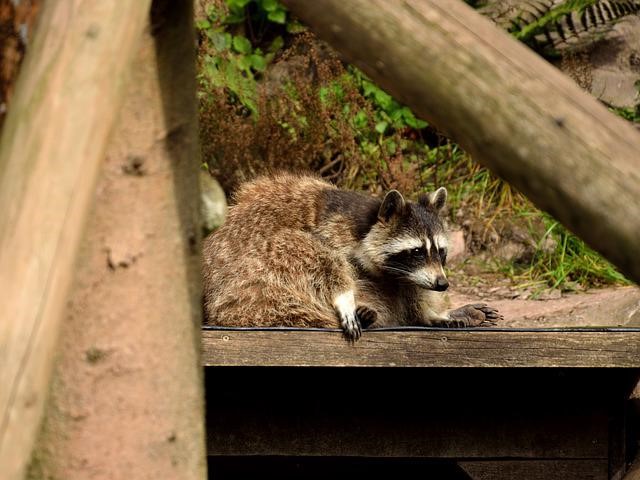A warning for all dog owners in the area – Dr. Leonard Fox, a Port St. Lucie veterinarian, is seeing an increase in distemper cases in raccoons, which can spread easily to dogs if they’re not vaccinated.
The surge in cases is also triggering concern by animal control officers who have also noticed the spike.
Distemper is a virus that raccoons can spread to dogs and it starts with symptoms like respiratory issues but can become much more serious. His concern is also heightened because he’s actually seeing it in dogs.
Dr. Leonard Fox said that it’s hard to say what’s causing the spike and suspects that construction and development leading to habitat destruction can push more raccoons to live closer together, which can lead to the easier spread of the virus.
Raccoons with distemper might be more approachable, but Fox’s advice is to stay away just in case.
Although it is easy to protect your dogs from getting distemper, the Humane Society of St. Lucie County recommends getting them vaccinated for just $20. Veterinarians typically charge around $30 for the vaccine.
Raccoons
Raccoons are mammals that belong to the family Procyonidae. They have bushy tails, and black “masks” around their eyes. Raccoons are native to North America but have been introduced to other parts of the world. They live in forests, marshes, and urban areas.
Raccoons are omnivorous, meaning they eat both plants and animals. They eat mostly insects, small mammals, and fruits and vegetables. Raccoons are very adaptable and can live in a variety of habitats.
Raccoons are usually nocturnal animals, meaning they are most active at night. However, they can also be active during the day if they need to find food. Raccoons are very curious animals and often explore their surroundings by climbing and raiding garbage cans.
Raccoons are considered nuisance animals because they often invade homes and businesses in search of food. They can cause a lot of damage by climbing on roofs and tearing through insulation, wiring, and other materials in search of something to eat. Raccoons are also known to carry diseases, such as rabies, that can be harmful to humans and pets. In some cases, raccoons can be aggressive and attack people or animals, especially if they feel threatened or cornered.
Diseases That Raccoons Carry
In addition to rabies, raccoons can also carry other diseases that can be harmful to humans and pets. Some of these diseases include:
• Distemper: Distemper is a virus that can affect raccoons, dogs, and other animals. It is most commonly spread through contact with an infected animal’s saliva, urine, or feces. Symptoms of distemper include fever, runny nose, watery eyes, and coughing. In severe cases, distemper can cause seizures, paralysis, and death.
• Salmonella: Salmonella is a type of bacteria that can cause food poisoning. It is often found in contaminated food or water. Symptoms of salmonella include diarrhea, vomiting, and fever. In severe cases, salmonella can lead to dehydration and death.
• Giardia: Giardia is a type of parasite that can infect the intestines of animals and humans. It is most commonly spread through contaminated food or water. Symptoms of giardia include diarrhea, vomiting, and weight loss. In severe cases, giardia can lead to dehydration and death.
How to Protect Yourself from Raccoon Diseases
There are several ways you can protect yourself from raccoon diseases:
• Avoid contact with raccoons: If you see a raccoon, do not approach it or try to touch it. Raccoons can be aggressive and may bite or scratch if they feel threatened.
• Wash your hands: If you come into contact with a raccoon or anything that a raccoon has touched, be sure to wash your hands thoroughly with soap and water.
• Vaccinate your pets: If you have a pet, be sure to keep them up-to-date on their vaccinations. Dogs and cats are particularly susceptible to raccoon diseases.
• Keep your garbage cans covered: Raccoons are attracted to garbage cans because they often contain food. Be sure to keep your garbage cans covered so that raccoons cannot get into them.
• Clean up after your pet: Raccoons can also contract diseases from contact with infected animal feces. Be sure to clean up after your pet if they go outside.
AAAC Wildlife Removal
If you are having trouble with raccoons on your property, it is important to find a competent wildlife removal company to help you resolve the issue. Raccoons are intelligent and dexterous animals that can cause a lot of damage to your property if they are not removed quickly and efficiently.
At AAAC Wildlife Removal, we have over 20 years of experience in raccoon removal from homes and businesses. We use the latest techniques and equipment to ensure that the job is done right. Our technicians are experts at raccoon removal, and we will work quickly and efficiently to resolve your issue. We will be happy to help you resolve the issue in a safe and effective manner. We also offer a variety of other services, such as animal proofing and repair, to help keep raccoons and other animals out of your property.
Our services offer a wide range of other wildlife removal services, including opossum removal, skunk removal, and squirrel removal. If you are having trouble with any type of wildlife on your property, please contact us today.
the news originally from: https://www.wptv.com/news/region-st-lucie-county/port-st-lucie/distemper-spike-in-raccoons-could-put-dogs-in-danger




